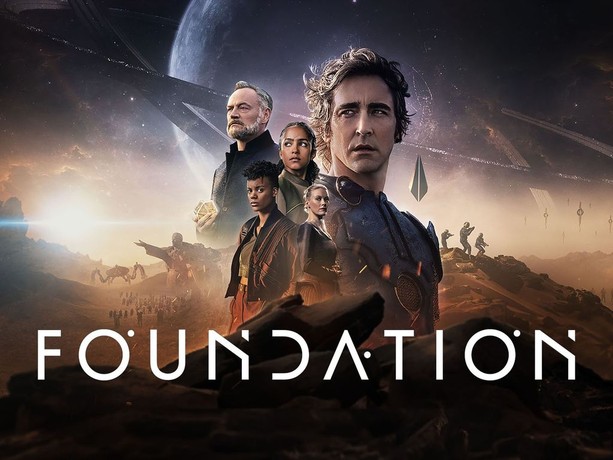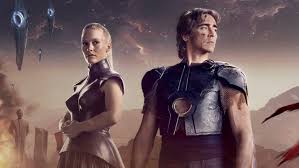Foundation (2021)

Foundation (2021) – Comprehensive Overview
📚🌌🚀👑
Overview
Foundation (2021) is a critically acclaimed science fiction television series developed by David S. Goyer and Josh Friedman for Apple TV+. Based on the seminal Foundation series of novels by renowned author Isaac Asimov, the show endeavors to translate Asimov’s expansive and intricate narrative into a visually stunning and intellectually engaging television format. The series premiered on September 24, 2021, and has since garnered attention for its ambitious storytelling, complex characters, and grandiose production values.
Plot Summary
Foundation is set in a distant future where the Galactic Empire, spanning the Milky Way, is in decline. The story follows Hari Seldon (played by Jared Harris), a brilliant mathematician who develops “psychohistory,” a scientific discipline that combines history, sociology, and mathematical statistics to predict the future behavior of large populations. Seldon foresees the imminent fall of the Empire, which will usher in a dark age lasting 30,000 years.
To mitigate this collapse and preserve human knowledge, Seldon devises a plan to establish the Foundation, a repository of human knowledge located at the edge of the galaxy. The Foundation is intended to serve as the seed for a new, enlightened civilization that will shorten the ensuing dark age to a mere 1,000 years.
The series unfolds across multiple timelines and locations within the galaxy, exploring the political intrigue, technological advancements, and personal struggles of various characters who play pivotal roles in the unfolding saga. As the Foundation faces external threats from neighboring star systems and internal challenges from within the crumbling Empire, the narrative delves into themes of power, destiny, and the resilience of knowledge.
Characters and Performances
- Hari Seldon (Jared Harris):
Harris portrays Hari Seldon as a visionary and deeply principled mathematician whose foresight shapes the destiny of humanity. His portrayal emphasizes Seldon’s intellectual prowess and moral conviction in the face of overwhelming odds. - Brother Day (Lee Pace):
Lee Pace plays Brother Day, one of the three clones who embody the Emperor of the Galactic Empire at different stages of life. Brother Day represents the established order and the complexities of maintaining continuity in leadership. - Brother Dusk (Terrence Mann):
Terrence Mann portrays Brother Dusk, the elder clone who oversees the Empire’s past and serves as a bridge between the past and present leadership. His character grapples with the Empire’s stagnation and the threat of its impending decline. - Brother Dawn (Lou Llobet):
Lou Llobet takes on the role of Brother Dawn, the youngest clone tasked with shaping the future of the Empire. His character embodies the hope and uncertainty of leadership at a time of transformation. - Salvor Hardin (Jadyn Wong):
Salvor Hardin is a cunning and resourceful leader of the Foundation. Wong’s portrayal captures Hardin’s strategic mind and her ability to navigate the political and military challenges facing the Foundation. - Gaal Dornick (Lou Llobet):
Gaal Dornick is a young mathematician and a protege of Hari Seldon. Her journey from a naive scholar to a key player in the Foundation’s survival highlights themes of growth and mentorship. - Hober Mallow (Brian Cox):
Hober Mallow is a skilled trader and diplomat whose efforts to expand the Foundation’s influence are crucial in its early development. Cox brings depth to Mallow’s pragmatic approach to leadership and diplomacy. - Ebling Mis (Jake McDorman):
Ebling Mis is a psychologist tasked with unraveling the mysteries of the Second Foundation, a hidden group that could alter the course of Seldon’s plan. His character embodies the tension between knowledge and secrecy.
Themes and Direction
- Fate vs. Free Will:
The series explores the tension between predestined paths laid out by psychohistory and the individual actions that can influence or alter these trajectories. Characters often face dilemmas that test their ability to adhere to or diverge from Seldon’s plan. - Power and Corruption:
As the Galactic Empire declines, the show delves into how power vacuums are filled and the corrupting influence of authority. The dynamics within the Empire’s leadership highlight the fragility of political structures. - Preservation of Knowledge:
Central to the narrative is the importance of preserving human knowledge and culture. The Foundation serves as a symbol of hope, representing humanity’s resilience and the enduring value of intellectual pursuit. - Survival and Adaptation:
Both the Empire and the Foundation must adapt to changing circumstances to survive. The series emphasizes the need for strategic thinking, innovation, and adaptability in the face of existential threats. - Identity and Legacy:
Characters grapple with their roles within the grand scheme of the galaxy’s fate. The clones embody the struggle between individual identity and collective legacy, questioning what it means to lead and preserve a civilization.
Direction by David S. Goyer and Josh Friedman:
Goyer and Friedman bring a cinematic quality to the series, combining high production values with intricate storytelling. Their direction ensures that Foundation maintains the intellectual depth of Asimov’s work while making it accessible and engaging for a modern audience.
Visuals and Cinematography
Foundation boasts stunning visual effects and expansive set designs that bring the vastness of the galaxy and the grandeur of the Galactic Empire to life. The cinematography, led by Ericson Core (known for The Mandalorian), employs sweeping camera movements and meticulously crafted environments to create an immersive viewing experience.
- Set Design:
The intricate architecture of the Empire’s capital and the utilitarian simplicity of the Foundation’s facilities reflect the differing philosophies and stages of development of each institution. - Special Effects:
Advanced CGI seamlessly integrates with practical effects to depict space travel, grand battle scenes, and the futuristic technology central to the series’ plot. - Costume Design:
The costumes are designed to reflect the status and personality of each character, from the regal and imposing attire of the Empire’s leaders to the practical and strategic outfits of the Foundation’s members.
Music and Soundtrack
The musical score, composed by Bear McCreary (renowned for his work on Battlestar Galactica and The Walking Dead), enhances the series’ epic scope and emotional depth. McCreary’s compositions blend orchestral elements with electronic sounds, creating a soundscape that underscores the grandeur and tension of the narrative.
- Themes:
Each major character and faction has distinct musical themes that reflect their motivations and struggles, adding an additional layer of storytelling through music. - Sound Design:
The sound design is meticulous, capturing the nuances of space environments, technological interfaces, and the ambient sounds of different planets and cultures.
Critical Reception
Upon its release, Foundation received a mixed to positive reception from critics and audiences alike. While some praised its ambitious adaptation of Asimov’s complex narratives and the high production quality, others critiqued the pacing and character development.
- Rotten Tomatoes:
The series holds an approval rating of around 73%, with praise directed towards its visual spectacle and faithfulness to the source material, while criticism focuses on its slow pace and complex plotlines that may be challenging for newcomers. - Metacritic:
Foundation has a Metascore of 63, indicating generally favorable reviews. Critics highlight the series’ potential for future growth and its ability to tackle profound philosophical questions.
Audience Response:
Fans of the original novels appreciate the series’ dedication to exploring the intricate details of Asimov’s universe. New viewers are drawn to the visually captivating storytelling and the high-stakes political intrigue, though some find the dense narrative a bit overwhelming.
Box Office Predictions and Cultural Impact
As a television series, Foundation’s success is measured more by viewership metrics and streaming performance rather than traditional box office earnings. The series has been successful in attracting a dedicated fanbase, contributing to Apple TV+’s growing reputation as a platform for high-quality original content.
Cultural Impact:
- Revitalization of Classic Sci-Fi:
Foundation plays a significant role in revitalizing interest in classic science fiction literature, introducing Asimov’s influential work to a new generation of viewers. - Influence on Future Adaptations:
The series sets a precedent for adapting complex literary works into serialized television formats, encouraging more ambitious projects in the genre. - Fan Engagement:
Active fan communities engage in discussions, fan theories, and content creation, fostering a vibrant cultural footprint around the series. - Technological and Philosophical Discourse:
The show sparks conversations about the role of predictive sciences, the ethics of leadership, and the preservation of knowledge, reflecting the enduring relevance of Asimov’s themes.
Conclusion
Foundation (2021) stands as a monumental effort to bring Isaac Asimov’s visionary science fiction saga to life on the screen. With its grand scale, intricate storytelling, and stunning visual execution, the series offers a compelling exploration of human civilization’s rise and fall, the interplay of fate and free will, and the enduring quest for knowledge and survival.
Under the expert direction of David S. Goyer and Josh Friedman, and with a talented ensemble cast led by Jared Harris, Foundation successfully captures the essence of Asimov’s work while expanding its narrative universe. Though it faces challenges in pacing and accessibility, the series holds significant promise for future seasons to further develop its characters and unravel the complex tapestry of its storytelling.
Whether you’re a die-hard fan of the original novels or a newcomer eager to delve into an epic science fiction narrative, Foundation offers an intellectually stimulating and visually spectacular journey through the annals of a galactic empire’s legacy.











